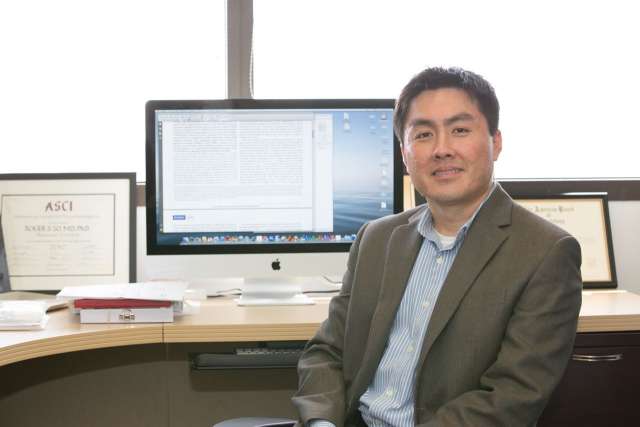Dr. Garcia-Jimenez is director of Oncology Research at UCLA-Olive View Medical Center and former chief fellow of the Hematology and Oncology Fellowship Training Program at the David Geffen School of Medicine at UCLA. She says over the past few years, cancer care has rapidly advanced and yet some groups of people still lack access to adequate care, novel treatments and clinical trials.
“With certain populations unable to access that care, it widens existing inequities,” says Garcia-Jimenez, who is also a researcher at the UCLA Jonsson Comprehensive Cancer Center. “This is unacceptable.”
Dr. Garcia-Jimenez, who was a member of the first cohort of the Robert A. Winn Career Development Award, formerly Diversity in Clinical Trials Award Program, aimed at improving the recruitment of diverse clinical trial participants, points to recent literature that shows Black Americans make up about 13% of the U.S. population, yet comprise about 5% of clinical trial participants.
It's even worse for Latinos, she says. “They make up about 18% of the U.S. population but make up less than 8% of clinical trial participants.”
Dr. Garcia-Jimenez says this gap in care is fueling her work in clinical trials.
“Clinical trials are how we advance science and our knowledge of cancer medicine or therapeutics,” she says, “and if certain populations are not part of those trials, then (the medical community) can’t say that we're doing it in an ethical manner.”
Part of her work includes designing strategies so that underrepresented and underserved communities can be more involved in the research process.
“By making sure that the individuals who participate in clinical trials are more broadly representative of the general population – whether that’s by age, gender, racial and ethnic background, etcetera – that's the only way we can be sure that our results, and what the FDA approves, are truly going to be helpful to everyone.”
A greater impact
Dr. Garcia-Jimenez’s interest in science from a young age and her involvement in helping her family navigate the U.S. health care system gave her a heightened sense of purpose. She knew she wanted to be a doctor, but she also wanted to shake up health systems to improve equity.
“During medical school, I was always trying to find projects that involved health disparities research,” she says.
While a HemOnc fellow, Dr. Garcia-Jimenez collaborated with the Simms/Mann-UCLA Center for Integrative Oncology and worked on a Tower Cancer Research Foundation grant-funded project that created a culturally congruent psychosocial care curriculum, expanding cultural mindfulness in psychosocial care.
In addition, together with a social worker and nutritionist, Dr. Garcia-Jiminez created a virtual webinar addressing Spanish-speaking patients' emotional challenges and nutritional concerns and the vital importance of self-advocacy with respect to their medical care. The webinar was an opportunity to educate and connect with Spanish-speaking patients about critical issues that affect many oncology patients.
Though Dr. Garcia-Jimenez first sought to pursue primary care, she switched to oncology when she realized she could have a greater impact there.
“I met patients with cancer and survivors of cancer and having that experience was kind of a turning point. I realized that primary care is really, really important, but a lot of people were doing that,” she says. “Not a lot of people who looked like me were working in oncology and on cancer care disparities.”
During her clinical rotation in the oncology wards, Dr. Garcia-Jimenez says, she encountered Latinas in their 30s with stage 4 breast cancer.
“Things like that shouldn’t be happening because we have an infrastructure for mammograms and education, but so many of these patients have other things going on.”
Housing, immigration status, health insurance, income, language barriers, culture and employment all affect health care outcomes, particularly for underserved and underrepresented racial and ethnic minorities, she says.
Dr. Garcia-Jimenez says she is certain that through community engagement and by bringing trials to people where they are, more oncologists will be able to address historical myths, misconceptions and fears about clinical trial participation. Common myths include the idea that clinical trial participants are “guinea pigs” who lack say in their participation, and that clinical trials aren’t helpful to patients overall.
Strategies to dispel myths and improve diversity include increasing patient awareness and understanding of clinical trials as well as opportunities to participate, providing information in different languages and factoring in the social determinants of health (SDOH), such as ensuring patients have access to transportation to get them to their appointments.
“Historically, the medical field has not necessarily approached racial/ethnic minority communities with the respect and the transparency that all human beings deserve and now we're left with having to bridge that gap,” she says.
In addition to tackling disparities in clinical trial diversity, Dr. Garcia-Jimenez hopes to change system-level health policies that currently aren’t designed with the patient in mind. She says hospitals need to increase the number of interpreters that are available and incorporate implicit bias training.
“That’s in part why I'm so passionate about this work, because I see how much there is to do,” she says. “I’m optimistic we can do better and start chiseling away at some of these things, slowly and methodically, until it gets done right.”
It is important to think about the patient journey, step-by-step, she adds, with patient-centered, equitable clinical trial design.
“I have learned that having members on a research team that are from underrepresented populations is central to reaching racial/ethnic minority patients with clinical trial recruitment efforts,” she says. “There is always room for growth, but persistence, asking questions, being open to trying new things, especially some less conventional, and learning from the process can go a long way.”
Join or learn more about clinical trials at the UCLA Jonsson Comprehensive Cancer Center.



